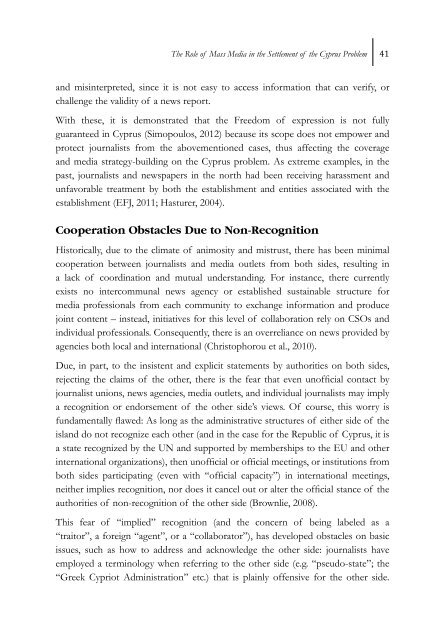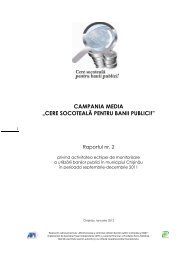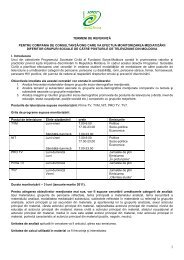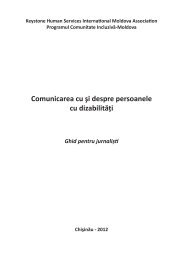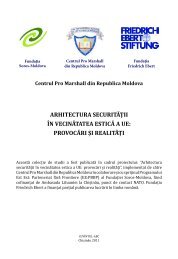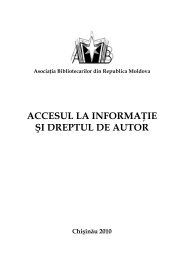Managing Intractable Conflicts: Lessons from Moldova and Cyprus
Managing Intractable Conflicts: Lessons from Moldova and Cyprus
Managing Intractable Conflicts: Lessons from Moldova and Cyprus
Create successful ePaper yourself
Turn your PDF publications into a flip-book with our unique Google optimized e-Paper software.
The Role of Mass Media in the Settlement of the <strong>Cyprus</strong> Problem<br />
41<br />
<strong>and</strong> misinterpreted, since it is not easy to access information that can verify, or<br />
challenge the validity of a news report.<br />
With these, it is demonstrated that the Freedom of expression is not fully<br />
guaranteed in <strong>Cyprus</strong> (Simopoulos, 2012) because its scope does not empower <strong>and</strong><br />
protect journalists <strong>from</strong> the abovementioned cases, thus affecting the coverage<br />
<strong>and</strong> media strategy-building on the <strong>Cyprus</strong> problem. As extreme examples, in the<br />
past, journalists <strong>and</strong> newspapers in the north had been receiving harassment <strong>and</strong><br />
unfavorable treatment by both the establishment <strong>and</strong> entities associated with the<br />
establishment (EFJ, 2011; Hasturer, 2004).<br />
Cooperation Obstacles Due to Non-Recognition<br />
Historically, due to the climate of animosity <strong>and</strong> mistrust, there has been minimal<br />
cooperation between journalists <strong>and</strong> media outlets <strong>from</strong> both sides, resulting in<br />
a lack of coordination <strong>and</strong> mutual underst<strong>and</strong>ing. For instance, there currently<br />
exists no intercommunal news agency or established sustainable structure for<br />
media professionals <strong>from</strong> each community to exchange information <strong>and</strong> produce<br />
joint content – instead, initiatives for this level of collaboration rely on CSOs <strong>and</strong><br />
individual professionals. Consequently, there is an overreliance on news provided by<br />
agencies both local <strong>and</strong> international (Christophorou et al., 2010).<br />
Due, in part, to the insistent <strong>and</strong> explicit statements by authorities on both sides,<br />
rejecting the claims of the other, there is the fear that even unofficial contact by<br />
journalist unions, news agencies, media outlets, <strong>and</strong> individual journalists may imply<br />
a recognition or endorsement of the other side’s views. Of course, this worry is<br />
fundamentally flawed: As long as the administrative structures of either side of the<br />
isl<strong>and</strong> do not recognize each other (<strong>and</strong> in the case for the Republic of <strong>Cyprus</strong>, it is<br />
a state recognized by the UN <strong>and</strong> supported by memberships to the EU <strong>and</strong> other<br />
international organizations), then unofficial or official meetings, or institutions <strong>from</strong><br />
both sides participating (even with “official capacity”) in international meetings,<br />
neither implies recognition, nor does it cancel out or alter the official stance of the<br />
authorities of non-recognition of the other side (Brownlie, 2008).<br />
This fear of “implied” recognition (<strong>and</strong> the concern of being labeled as a<br />
“traitor”, a foreign “agent”, or a “collaborator”), has developed obstacles on basic<br />
issues, such as how to address <strong>and</strong> acknowledge the other side: journalists have<br />
employed a terminology when referring to the other side (e.g. “pseudo-state”; the<br />
“Greek Cypriot Administration” etc.) that is plainly offensive for the other side.


